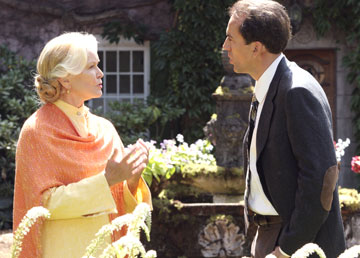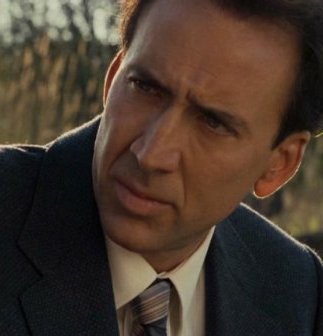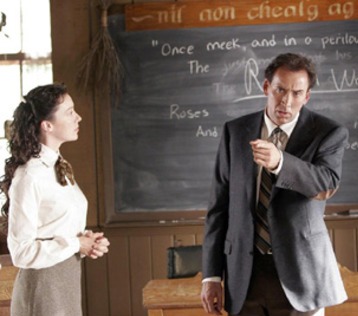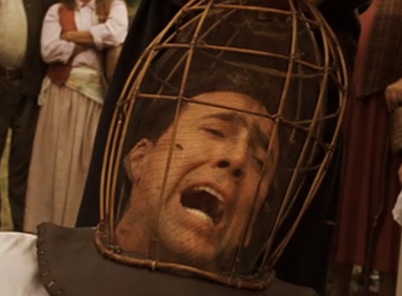 So, to escape the sun for an afternoon (even while vacationing in paradise, sometimes you need an off-day), the family and I went to catch an impromptu double-feature over the weekend, the first half being Neil LaBute’s muddle-headed update of The Wicker Man. Going in absolutely cold, I suppose Wicker might make for a reasonably tolerable and diverting two hours, although I found the pacing rather stilted in any case. But if you’re at all familiar with the 1973 Edward Woodward/Christopher Lee cult classic, The Wicker Man seems like a pretty egregious misfire. Using some nefarious pagan alchemy, LaBute has stripped out much of the intriguing religious ruminations (as well as the sexiness and sense of humor) from the original Wicker Man and replaced it with a lethal dose of over-the-top LaBute-brand misogyny. In effect, he’s transmuted gold into lead.
So, to escape the sun for an afternoon (even while vacationing in paradise, sometimes you need an off-day), the family and I went to catch an impromptu double-feature over the weekend, the first half being Neil LaBute’s muddle-headed update of The Wicker Man. Going in absolutely cold, I suppose Wicker might make for a reasonably tolerable and diverting two hours, although I found the pacing rather stilted in any case. But if you’re at all familiar with the 1973 Edward Woodward/Christopher Lee cult classic, The Wicker Man seems like a pretty egregious misfire. Using some nefarious pagan alchemy, LaBute has stripped out much of the intriguing religious ruminations (as well as the sexiness and sense of humor) from the original Wicker Man and replaced it with a lethal dose of over-the-top LaBute-brand misogyny. In effect, he’s transmuted gold into lead.
 Part of the fun of watching the original 70s-era Wicker Man is figuring out what the hell it is in the first place. Between song-and-dance numbers and the landlord’s daughter (Britt Ekland) famously in dishabile, Wicker swings wildly to and fro in a pagan delirium of genres…well, until it all starts to go horribly wrong (and even then Chris Lee is rocking that ridiculous turtleneck.) But in LaBute’s version, we’re in dour thriller mode from the get-go, as we watch well-meaning, earnest California highway patrolman Edward Malus (Nicholas Cage) experience a truly horrible day at the office. (Between this and World Trade Center, cop-Cage has been having a really tough week on screen, the kind martyriffic Mel Gibson probably dreams about.) As Malus recuperates from his harrowing (and ultimately somewhat nonsensical) day, he receives a letter from an old flame, Willow (Kate Beahan), begging him to visit her home — here an island off the coast of the Pacific Northwest — to help her locate her missing daughter Rowan. Soon, Malus absconds to the Verizonless village of Summersisle to chat up the bizarre town elders, which include Deadwood‘s Molly Parker, Six Feet Under‘s Frances Conroy, and the Queen Bee of Summersisle herself, Ellen Burstyn (still looking radiant and still deserving better), about the possible abduction. But, as he ventures deeper into this strange realm, Malus unearths not only an elaborate conspiracy of silence but a dark plot to put ancient pagan magic to the service of the island’s foundering fortunes…
Part of the fun of watching the original 70s-era Wicker Man is figuring out what the hell it is in the first place. Between song-and-dance numbers and the landlord’s daughter (Britt Ekland) famously in dishabile, Wicker swings wildly to and fro in a pagan delirium of genres…well, until it all starts to go horribly wrong (and even then Chris Lee is rocking that ridiculous turtleneck.) But in LaBute’s version, we’re in dour thriller mode from the get-go, as we watch well-meaning, earnest California highway patrolman Edward Malus (Nicholas Cage) experience a truly horrible day at the office. (Between this and World Trade Center, cop-Cage has been having a really tough week on screen, the kind martyriffic Mel Gibson probably dreams about.) As Malus recuperates from his harrowing (and ultimately somewhat nonsensical) day, he receives a letter from an old flame, Willow (Kate Beahan), begging him to visit her home — here an island off the coast of the Pacific Northwest — to help her locate her missing daughter Rowan. Soon, Malus absconds to the Verizonless village of Summersisle to chat up the bizarre town elders, which include Deadwood‘s Molly Parker, Six Feet Under‘s Frances Conroy, and the Queen Bee of Summersisle herself, Ellen Burstyn (still looking radiant and still deserving better), about the possible abduction. But, as he ventures deeper into this strange realm, Malus unearths not only an elaborate conspiracy of silence but a dark plot to put ancient pagan magic to the service of the island’s foundering fortunes…
 Not to give the game away, but the trick in the original film (penned by Anthony Shaffer, brother of Amadeus writer Peter) is that the visiting cop (Edward Woodward) is a devout Christian who finds himself alternately horrified and tempted by the ritualistic seductions of the island’s pagans (His religiosity also provides grist for various disquisitions on martyrdom, crucifixion, and sacrifice by that island’s leading citizen, Christopher Lee.) But, LaBute’s conceit here, as you might expect if you’ve ever seen anything else he’s done (and I’ll admit to actually quite liking In the Company of Men), is that Summersisle is a radical matriarchy, with women holding all positions of power, girls the only students in the local schoolhouse, and men either killed at birth — courtesy of Ruth Fisher — or kept as docile, tongue-less workers and “breeders.” Explained another way, Summersisle’s cash crop in the original film is apples, the fruit of temptation, knowledge, and disobedience to divine will. Here’s it’s honey, which LaBute uses instead to make all kinds of unwieldy queen bee and drone bee metaphors (“The drone must die!,” women scream at Cage in one scene), to say nothing of the dangers of, um, honeypots.
Not to give the game away, but the trick in the original film (penned by Anthony Shaffer, brother of Amadeus writer Peter) is that the visiting cop (Edward Woodward) is a devout Christian who finds himself alternately horrified and tempted by the ritualistic seductions of the island’s pagans (His religiosity also provides grist for various disquisitions on martyrdom, crucifixion, and sacrifice by that island’s leading citizen, Christopher Lee.) But, LaBute’s conceit here, as you might expect if you’ve ever seen anything else he’s done (and I’ll admit to actually quite liking In the Company of Men), is that Summersisle is a radical matriarchy, with women holding all positions of power, girls the only students in the local schoolhouse, and men either killed at birth — courtesy of Ruth Fisher — or kept as docile, tongue-less workers and “breeders.” Explained another way, Summersisle’s cash crop in the original film is apples, the fruit of temptation, knowledge, and disobedience to divine will. Here’s it’s honey, which LaBute uses instead to make all kinds of unwieldy queen bee and drone bee metaphors (“The drone must die!,” women scream at Cage in one scene), to say nothing of the dangers of, um, honeypots.
 Put simply, LaBute has basically chosen to use The Wicker Man as a cartoonish vehicle for his woman-hating issues, and the result is not only a serious diminishment of the original film, but also more than a little childish and embarrassing. [Note: From now herein, I’ll be talking about major, end-of-movie type spoilers — Quit reading if you don’t want to know.] In the end, look closely, and you find that there wasn’t a single sympathetic female character in the film, even folks who have no business being involved in the conspiracy. (LaBute ultimately even sinks so low as to have Cage gratuitously beat the crap out of a few “evil” chicks, including Leelee Sobieski, who’s inexplicably turned into a ravenous vampire or somesuch for this one scene, all accompanied with John Wayne-type punch sound editing.) And, perhaps worst of all, LaBute ends this version not with the climax of Cage’s story but a woefully misguided coda involving James Franco at a singles bar, thus turning the whole enterprise into basically one long, unnecessary remix of the kidney thieves story.
Put simply, LaBute has basically chosen to use The Wicker Man as a cartoonish vehicle for his woman-hating issues, and the result is not only a serious diminishment of the original film, but also more than a little childish and embarrassing. [Note: From now herein, I’ll be talking about major, end-of-movie type spoilers — Quit reading if you don’t want to know.] In the end, look closely, and you find that there wasn’t a single sympathetic female character in the film, even folks who have no business being involved in the conspiracy. (LaBute ultimately even sinks so low as to have Cage gratuitously beat the crap out of a few “evil” chicks, including Leelee Sobieski, who’s inexplicably turned into a ravenous vampire or somesuch for this one scene, all accompanied with John Wayne-type punch sound editing.) And, perhaps worst of all, LaBute ends this version not with the climax of Cage’s story but a woefully misguided coda involving James Franco at a singles bar, thus turning the whole enterprise into basically one long, unnecessary remix of the kidney thieves story.
In sum, this Wicker Man at best feels akin to a middling episode of Nightmares and Dreamscapes on TNT. At worst, it’s a seriously wrong-headed remake and a mortifying enterprise for Cage, Burstyn, and co. to have been a part of. Do yourself a favor: Burn this sucker down and rent the original.
